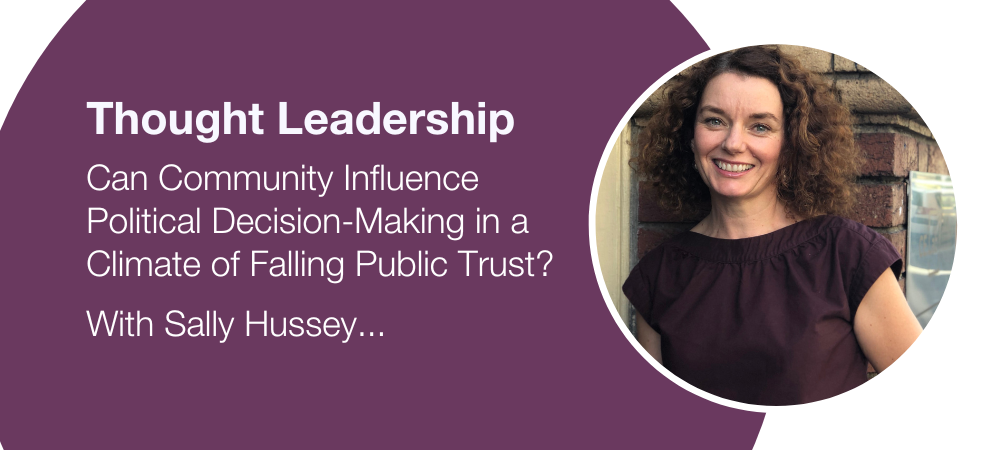Can Community Influence Political Decision-Making in a Climate of Falling Public Trust?

With Sally Hussey | Consultant Writer and Researcher.
Second in the IAP2 Australasia thought leadership series, outlines challenges and recommendations for engagement in public decision-making.
How can we explore community influence in decision-making when outcomes are unreliable and community has little trust in them?
My new thought leadership paper for IAP2 Australasia strives to understand more deeply the intersection of community influence and public decision-making, especially in the context of the increased visibility of engagement activities on the one hand, and declining trust in government, on the other.
On a manifest level, through the provision of recommendations, it looks to indicate the potential of engagement in public decision making – however much of it is produced within the context of society becoming more unequal, challenges around climate chaos, economic deterioration, and inordinate demands placed on public health systems, or the so-called ‘polycrisis’ of which marginal and vulnerable communities face the full force. Indeed, public decisions determining long-term goals – climate, energy security and pricing, workforce dynamics, housing affordability and the imminent historic referendum, the Voice to Parliament – are in direct dialogue with the current practice of engagement.
Responding to the dilemma of falling public trust, however, the findings not only outlined confused expectations that work against building institutional relationships with communities, but the dire need to address culturally diverse engagement. In addition, the issue of project-by-project engagement fails to address long-term impacts for the betterment of democracy and democratic processes.
Challenges facing engagement practice in public decision-making
Through at-length interviews with key actors in engagement in Australia and New Zealand – political advisors, researchers, academics, consultants and professionals working across private and public sectors – I identified five fundamental challenges that impact community influence in public decision making:
- Decision-makers are out of step with engagement practice
- The lack of meaningful engagement creates disconnect with communities
- Confused expectations undermine transparency and trust
- Point-in-time engagement fails to address long term impacts for the betterment of democracy
- The acute need to address inclusivity and culturally diverse engagement.
A suite of recommendations are provided as a way of meeting these challenges and include key recommendations for engagement practitioners, outlining how they can improve community input in decision-making processes to improve engagement outcomes.
Engagement practitioners need a seat at the decision-making table
Doubtless, the rise in the professionalisation of community engagement can’t be ignored – particularly given its increased legislation over the last two decades. But it doesn’t necessarily indicate surety around what community capacity or local knowledge can bring to decision-making processes. Especially where engagement practitioners and professionals are navigating received ways of involving communities, and decision-makers in political contexts are increasingly constrained by resources and a focus on outcomes within election or policy cycles.
Of course, government reforms promote equity through processes of engagement. But policy-making is not commensurate with engaging communities, specifically vulnerable and marginal communities, in relation to longer-term decision-making goals.
One key recommendation in Community Influence in Public Decision-Making is ensuring engagement practitioners have a seat at the decision-making table. That is, where engagement practitioners are involved at senior levels of decision-making processes to ensure minimum standards and where subject matter experts are not extraneous to an engagement process, but inherent to outcomes, that is, responsible for engagement.
This research looks at how to bring decision-makers and decision-making in step with community engagement, particularly where leadership processes have led to default ‘tick the box’ or transactional engagement and disconnect with communities who increasingly have little trust in decision-making outcomes. As one interviewee put it: ‘Ultimately politicians feel that they are elected to deliver on a mandate, and they feel like the election is their community consultation.’
Improving decision-making processes builds trust
Without question, twenty-first century decision-making has entered pernicious waters. Issues such as climate chaos make a radical disruption in cultural and economic business-as-usual. In effect, this underscores the urgency of community engagement and placing people and communities at the centre of decision-making. While the pursuit of rapid emissions reductions is no longer a non-radical option, the involvement of communities in strategies, recommendations and policies for mitigation and adaptation is expected.
The issue of community influence in public decision-making warrants a proper inquiry, particularly in the current complex policy-making environment and endemic public falling trust.
That there is a demand from governments globally for more sustainable decision-making, has meant that the commitment for community engagement must go beyond the transactional. Engaging communities in decision-making not only offers an opportunity for improved democracy, improving the institutional relationship between governments and communities. But it strengthens democratic outcomes for marginalised and vulnerable communities and starts to build trust.
Community Influence in Public Decision-Making is freely available to download at IAP2 Australasia here.
 Author Bio: Sally Hussey is a consultant writer and researcher who interrogates global challenges in public engagement and community consultation. She informs on-the-ground practitioners, policy and public engagement professionals through providing leading-edge insights and analysis to better understand the vital issues affecting how communities might thrive in democracies. Sally is the author of Future Skills for Engagement Practitioners (2022, IAP2 Australasia) and the recently published Community Influence in Public Decision-Making (2023, IAP2). She has an extensive background in the publishing, academic and arts sectors and is recognised by the Who’s Who of Australian Women.
Author Bio: Sally Hussey is a consultant writer and researcher who interrogates global challenges in public engagement and community consultation. She informs on-the-ground practitioners, policy and public engagement professionals through providing leading-edge insights and analysis to better understand the vital issues affecting how communities might thrive in democracies. Sally is the author of Future Skills for Engagement Practitioners (2022, IAP2 Australasia) and the recently published Community Influence in Public Decision-Making (2023, IAP2). She has an extensive background in the publishing, academic and arts sectors and is recognised by the Who’s Who of Australian Women.
